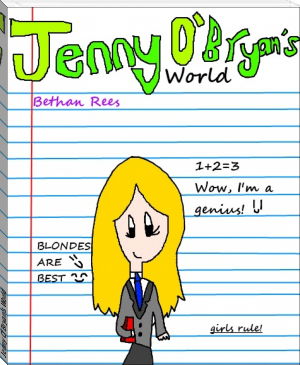The History and Records of the Elephant Club by Doesticks and Underhill (leveled readers txt) 📖

- Author: Doesticks and Underhill
Book online «The History and Records of the Elephant Club by Doesticks and Underhill (leveled readers txt) 📖». Author Doesticks and Underhill
 desperate deed; I had resolved to see that butcher, to meet that butcher, to challenge that butcher, to fight that butcher, to conquer that butcher or to die; yesterday I went to that butcher's shop to execute my design, but he kicked me out. To day I came in here in despair; who should come in but the butcher; now was my chance; I rushed at him, but my personal strength was not equal to the task; he boxed my ears, pulled my nose, and I was cheated out of my revenge, simply because I wasn't able to lick him. Now I demand of this intelligent assembly, as a matter of right, the instant annihilation of the one-eyed butcher now present, the author of all my miseries, that my Betsey may be restored to me.'
desperate deed; I had resolved to see that butcher, to meet that butcher, to challenge that butcher, to fight that butcher, to conquer that butcher or to die; yesterday I went to that butcher's shop to execute my design, but he kicked me out. To day I came in here in despair; who should come in but the butcher; now was my chance; I rushed at him, but my personal strength was not equal to the task; he boxed my ears, pulled my nose, and I was cheated out of my revenge, simply because I wasn't able to lick him. Now I demand of this intelligent assembly, as a matter of right, the instant annihilation of the one-eyed butcher now present, the author of all my miseries, that my Betsey may be restored to me.'
"Mr. Jenkins sank into a chair, exhausted by his effort.
"The butcher wiped his chops on a red silk handkerchief, and then proceeded to tell his story, which was as follows, as appears by Wagstaff's notes;
"'This here feller's allers botherin' my wife, 'cause he says she's his'n; yesterday he gits drunk, comes in my place, and wants to fight me. I told him to leave, and he wouldn't, so I hussled him out. I happened to come in here jus' now, and he comes[Pg 177] at me. I doubles him up, and that's the hull story.'
"The laconic statement of the one-eyed stubby butcher satisfied the parties assembled that Mr. Jenkins's insane pursuit of another man's wife had justly brought upon him the indignation of the husband, and he was advised very generally, in the future, to cease all importunities of a similar character.
"Finding that his story excited no sympathy in his behalf, Mr. Jenkins left the place in disgust, and the three Elephantines soon after left in an omnibus."
Mr. Spout here arose, and said he liked the story in all of its parts, except the concluding joke, which he considered to be, not only unkind, but uncalled for. He should take the liberty of considering it expunged from the records.
Some member here dared to suggest that it was high time that the Higholdboy should do something else than criticise the contributions of his fellow-members.
Mr. Spout desired it to be understood that he should admit of no dictation from inferiors; that he should exercise his own discretion in deciding whether he would contribute to the amusement of others, or criticise them in their efforts to be jolly. Yet, without giving up any of this right, he would volun[Pg 178]teer to lay before the club, on the present occasion, a matter which, to him, possessed some points of interest, and as he didn't care whether it interested the others or not, he should state facts for his own amusement. He intended to laugh at everything which he thought was funny, without any reference to the comfort of others.
"The circumstance which I am about to relate," said Mr. Spout, "is one in which a friend of mine was involved. My friend's name," he continued, "is Bartholomew Buxton. He is the owner of a book-store, and was led into that business on account of a thirst for reading. He is a man of about thirty-five years, and his whole life has been passed in poring over books. I regard him as a man of very rare intelligence, though his intellect is not, perhaps, very fruitful of original thoughts. What is remarkable with him is his personal appearance. He is a little man, just large enough to be entitled to enter the army—that is to say, 'five-foot-four.' His body is very small, and his head very large, round, and full. His hair is of a sandy color, and of the scratch wig order of cut. His eyes are small, and one of them squints frightfully. His complexion is quite pale. In the matter of dress, he wears usually a pair of pants of a checker-board-pattern-on-a-large-[Pg 179]scale cloth, blue dress-coat, ornamented with large fancy brass buttons, and a vest—a double-breaster—of the brightest scarlet. But these eccentricities in apparel would hardly attract attention so long as the main feature of his dress is visible. That feature is his collar. It is a remarkable collar—a mighty rampart of linen, which encircles his head in a line with the centres of his ears, almost meeting in his face. Numerous reasons have been assigned for Mr. Buxton's going to such lengths (or rather heights) in his indulgence in collar. One idea advanced is, that he is actuated by a desire to economize in the expenses of washing, and to do this, has the garments made in such a way as to be convertible into collars at either end. Another suggestion is, that the collar is a matter of utility, designed by Mr. Buxton to economize physical strength, which, inasmuch as his head is very large and his body very small, must be overtaxed to hold his ponderous brain-box erect.
"Gentlemen, three days since I received a call from my friend Buxton. He appeared melancholy and dejected, which surprised me; but what surprised me more, in respect to his present appearance, was the manifest disarrangement of his collar. It did not stand up on one side with the majestic erect[Pg 180]ness which characterized it on the other. On the left it was hanging down flabbily; its self-sustaining power was departed.
"I saw, by his countenance, that something important to him had occurred, and the appearance of his collar only tended to confirm my suspicions. I accordingly asked him what was the trouble.
"'Trouble,' said he, 'enough of it. Sir,' he continued, 'last night I was locked up in a cell at the station-house, for exercising the privileges of a freeman—a native American citizen. I was arrested, and violently dragged off to that cell, where I remained last night, and this morning was tried before the magistrate, only, however, to be acquitted. What made it worse was, that I should be arrested with a nigger, and be tried with a nigger, and acquitted with a nigger. He was a huge nigger—a colossal nigger—a nigger fully six feet and four inches in height; his face betrayed no evidence of light—it was all shade; he was a nigger, above all others, so black, that he would make an excellent drum-major to a funeral procession, if custom sanctioned the employment of that non-commissioned official on such occasions. Inasmuch, however, as custom doesn't do any such thing, the next best use to which the sable giant could be put, would be to[Pg 181] make his face the figurehead of a Broadway mourning store; with the exception of his large size and remarkable black face, the nigger in question looked very much like other niggers not in question. He was a nigger, in fact, who gave as his name the half-classic and half-descriptive appellation of Cesar Freeman. I have always been a "woolly-head" until now, but may I be bursted if I don't go and join the Know Nothings to-morrow, and begin a crusade against all niggers—particularly nigger-giants and nigger women.
"'How did this occur?' I inquired, anxiously.
"'I'll tell you,' said he. 'But before doing so however, I desire to state a fact. We have all our human weaknesses; indeed, it may be set down as a truism that human beings do have human weaknesses to a greater or less extent; I am a human being; I have my human weakness, and that weakness is my collars; it required years of experiment to bring my collars to their present perfection; nearly all of the quarrels I ever had have been with laundresses who have failed to do them up to my liking; if a man wishes to ruffle my temper he need only to ruffle my collar, and it is accomplished; tell me the Savings Bank, where I deposit my extra money, has collapsed in the region of the money-vault; tell me that I have[Pg 182] got to attend a charity ball; give me the jumping toothache; place me in a Bowery stage with fourteen inside, and I in juxtaposition to a dirty woman with a squalling baby who has got the seven years' itch—all of these I can bear, but when it comes to interfere with my collars it is going a point too far. Now I come to the time when unforeseen circumstances brought me in violent collision with this nigger of African extraction; I was walking down the street, near where the belligerent demonstration took place, when I saw directly in front of me a long-tailed man in an amiable-appearing coat—no—an amiable-appearing coat in a long-tailed—no—I mean an amiable-appearing man in a long-tailed coat.





Comments (0)